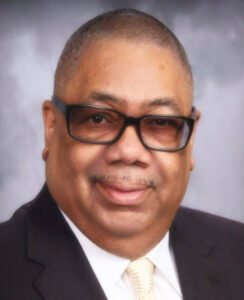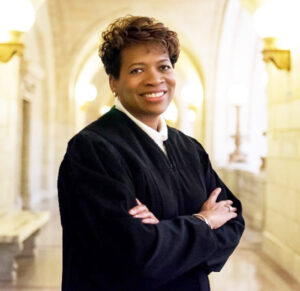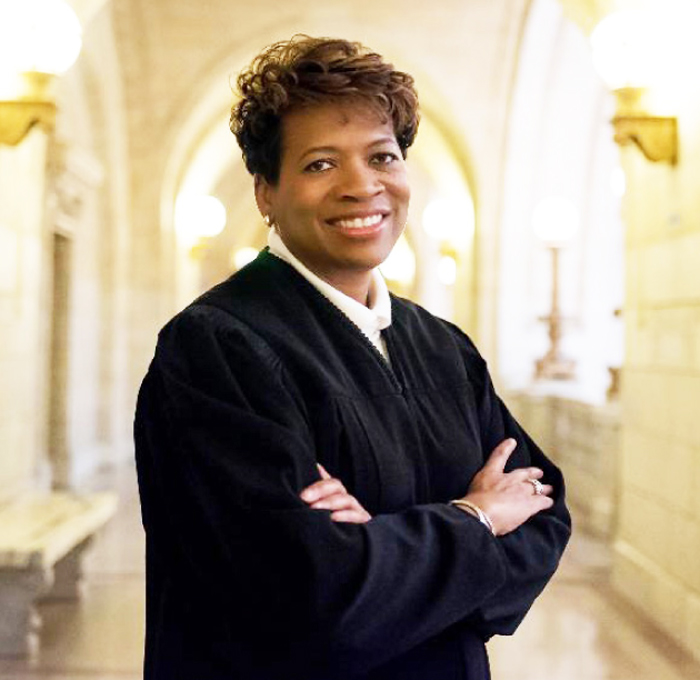
by Rev. Donald L. Perryman, Ph.D.
The Truth Contributor
History teaches us that grave threats to liberty often come in times of urgency, when constitutional rights seem too extravagant to endure.
– Thurgood Marshall
The most significant political races in the 2024 election cycle are the Ohio Supreme Court races, where control of the court’s balance is at stake. The Republicans currently hold a narrow 4-3 majority. However, the results could shift the court’s composition and direction if Democrats retain their incumbents and secure an additional seat.
Former Obama-era Attorney General Eric Holder has pointed out that decisions made in state supreme courts often impact our daily lives even more directly than federal elections. The court must, therefore, ensure that it serves all Ohioans fairly as it interprets recently voter-approved constitutional amendments impacting abortion rights and upcoming decisions on utility rates, redistricting, and other key issues.
Justice Melody Stewart, the first African American woman elected to the Ohio Supreme Court, is front and center of these looming decisions and their pervasive impact on Ohioans. Stewart’s unique perspective offers Ohioans a voice in the judiciary that mirrors their diverse experiences.
Raised by a single mother and a “village” of teachers, family members, and other positive community members who instilled values of integrity and perseverance, Stewart received her undergraduate degree in music from the University of Cincinnati’s College-Conservatory of Music before earning her J.D. from Cleveland State University’s Cleveland-Marshall College of Law and a Ph.D. from Case Western Reserve University’s Mandel School of Applied Social Sciences.
A brilliant woman of color and well-prepared for her role on Ohio’s Supreme Court, her career spans institutions of higher learning, having served as an assistant dean and lecturer at Cleveland-Marshall, where she taught ethics, criminal law, criminal procedure, and legal writing in roles at Case Western, the University of Toledo College of Law and Ursuline College. Stewart was elected to Ohio’s Eighth District Court of Appeals in 2006 and served until her 2018 election to the Ohio Supreme Court.
 In our conversation, Justice Stewart reflects on her journey and elaborates on why diverse perspectives on the court are crucial to a fair and equitable judicial system.
In our conversation, Justice Stewart reflects on her journey and elaborates on why diverse perspectives on the court are crucial to a fair and equitable judicial system.
Perryman: Tell us about your journey to become the first African American woman elected to the Ohio Supreme Court, your challenges, and how you overcame them.
Stewart: Reflecting on my struggles, I realize that while I faced my share, they were not as intense as those of my mother’s generation. My mother grew up in the segregated South, where schools for Black children went only to the eighth grade, and she experienced overt racism that I couldn’t imagine enduring. She raised me alone, working nights at the post office to provide for us. Despite our limited means, she always kept our rented apartment neat, teaching me pride and respect.
My father didn’t raise me or support me, but I had a relationship with him later in life. But my mother’s dedication was unwavering—she even took extra shifts to pay for my music lessons after my kindergarten teacher noticed my interest. This support allowed me to become my high school choir’s accompanist and eventually earn a bachelor’s degree in music. So, the “village” raised me and instilled the strength, ambition, and resilience that have shaped my path and values.
Perryman: You were a music major in college. How do you think music affected your perspective on the bench?
Stewart: My background in music, study of orchestration, and score reading helped me with details – the finer details and the analytical aspect of law school. It helps me now in practicing law, teaching law, proofreading and writing about the law. For me, it has to read right. It’s got to sound right. It’s got to flow right. So, I attribute that to the musical aspect of my training.
Perryman: You also have a Ph.D. in social science and have been an educator. How do those experiences blend together to shape your worldview and judicial philosophy?
Stewart: You asked a perfect question. My music training sharpened my analytical skills, teaching me attention to detail, flow and harmony. Law school provided the foundation for thinking like a lawyer, understanding black letter law and navigating the interplay between statutes and the Constitution.
My Ph.D. training taught me to ask the right questions on the bench and consider the unintended consequences of judicial decisions. It reminded me that we are not all-knowing in our robes. The Ph.D. also emphasized the importance of data in checking implicit biases—those unconscious tendencies, both positive and negative, that can lead to systemic unfairness and influence judicial decisions in subtle but profound ways.
Perryman: We’re seeing a dramatic increase in voter restriction laws nationwide. How can Ohio set an example for protecting voting rights?
Stewart: For me, it always comes back to education. Political strategists and partisan officials often exploit those with less education, using factors that disproportionately affect certain populations to limit their voting rights. This includes issues like lacking ID or license suspensions, which further marginalize communities. Meanwhile, claims of widespread voter fraud seem more like dog whistles, as unlawful voting is a low priority for most people simply seeking resources or opportunity.
If we aren’t vigilant, these subtle erosions of rights will escalate, echoing the restrictions of Jim Crow days. To combat this, we must proactively understand and utilize the laws to level the playing field.
Perryman: You’re running against someone with a long history of working as a prosecutor. How can the courts contribute to meaningful changes in policing and criminal justice practices that disproportionately affect African Americans and other minorities?
Stewart: Let me make a minor correction: that long-time prosecutor is running against me. He’s leaving a seat given to him by the governor to try to run and take the seat that I’m in.
Perryman: Thank you for correcting me.
Stewart: I have never run to take a seat from someone of an opposing party; I have always waited for open seats or retirements. While others may run against incumbents, I find it distasteful, especially when it involves a good public servant, regardless of their political affiliation.
In contrast, my opponent openly campaigns with a “prosecutor in a robe” approach, emphasizing public safety in their ads. This message implies they’ll consistently rule in favor of the state—more fitting for a role like attorney general or county sheriff, not a Supreme Court justice.
As justices, our duty is to impartially uphold the Constitution and laws for everyone, even when the outcome is uncomfortable.
Perryman: How do you approach cases where women’s rights intersect with broader constitutional and social issues?
Stewart: I haven’t yet had the chance to address certain high-profile issues in court, like reproductive freedom or gerrymandering, as these cases typically attract media attention. However, my approach is not determined by the topic but by constitutional analysis. Whether it involves reproductive rights, search and seizure, free speech or cruel and unusual punishment, each case undergoes the same rigorous constitutional review.
When these cases reach the court, we will conduct a constitutional analysis to determine if current statutes violate the amendment. Those that do will be struck down; those that can coexist with the amendment will remain in place.
Perryman: What role does The Ohio Supreme Court play in ensuring fair districting?
Stewart: The Ohio Supreme Court ruled seven times that the redistricting maps were gerrymandered, yet the redistricting committee ignored these rulings. People often ask why we didn’t hold them in contempt or jail them, but the judiciary lacks enforcement powers—unlike the executive branch’s “power of the sword” or the legislative branch’s “power of the purse.” No one expected elected officials to defy a Supreme Court order, but recent events, like January 6th, reveal a new disregard for legal authority.
Current constitutional provisions don’t empower the Supreme Court to enforce fair maps, but the “Citizens, Not Politicians” proposed amendment would change that. This amendment would establish a 15-member, nonpartisan redistricting commission and, if needed, allow the Supreme Court to ensure fair maps are drawn. This approach aims to prevent one-party dominance, as currently seen across Ohio’s executive, legislative and judicial branches, which undermines the checks and balances essential to democracy.
Perryman: Regarding the legal aspects of book bans, how can courts protect freedom of expression while balancing community concerns?
Stewart: Personally, book bans are primarily a community and court matter. While I agree that certain books should be age-appropriate and that parents should have input, I don’t believe parents should control entire curricula. Parents should have the right to restrict certain books for their own children but not for others. I am strongly against book bans, as they impose one family’s preferences on an entire school.
There is a balance to be found; parents’ concerns about age-appropriateness should be respected without erasing history or restricting access to knowledge. Book bans aimed at “protecting” children from uncomfortable truths—especially historical facts—are misguided and risk undermining education for all.
Perryman: How do you balance economic development with the need for environmental sustainability, particularly in communities of color, which are often disproportionately affected by pollution and poor air quality? I know in northwestern Ohio, that would include the lack of access to clean water.
Stewart: Without leaders committed to the long-term well-being of our communities, we risk leaving future generations in an unhealthy and unsustainable world. Many officials seem more focused on the next election, donor, or special interest group than the greater good. This short-sightedness, often ignoring science or dismissing environmental concerns, disproportionately harms poor communities and communities of color, as policies impacting health and safety frequently target these areas.
To ensure a healthier future, citizens must demand that elected officials take these issues seriously, balancing economic development with environmental and public health. If those in office aren’t acting in the community’s best interests, we need to elect leaders who will. These are concerns I ponder not just as a jurist but as a citizen committed to a just and sustainable society.
Perryman: As a justice on the Ohio Supreme Court, you make very difficult and maybe even life-altering decisions affecting many people. What keeps you grounded?
Stewart: I go back to what my mother always said, “Always leave a place better off than it was before you got there.” You want to have a positive impact on somebody’s life, and I think most people want that. I always try to stay faithful to that calling. That’s what keeps me grounded.
I know everything I am is from the village that raised me from the tremendous amount of God’s grace and I just want to do what I’m supposed to do according to His will. I’m grateful for the opportunities I have had.
Perryman: What message do you have for young African Americans or other people of color who aspire to work in the legal profession?
Stewart: I recently spoke with Representative Elgin Rogers, who emphasized that Black men’s voices are often overlooked. My message to everyone in the African American community, both men and women, is that we all have the power to make a positive difference in our lives, our families, and our communities. If we, as adults, don’t believe in our potential, we risk passing down that disbelief to future generations, setting them up for missed opportunities.
Every child, including those in the African American community, has the potential to be anything they aspire to be. But they need communities that surround them with positive role models, resources, and support. Without this, they are more vulnerable to paths that may limit their potential, such as early pregnancy or incarceration. Even those who have made poor decisions deserve the opportunity to reintegrate and contribute to society.
Many young people face trauma, food insecurity and other challenges, and it’s our duty to recognize and address these issues. This is not complicated; we simply need to commit to giving every child a fair chance to reach their fullest potential.
Perryman: Thank you for the opportunity to chat with you.
Stewart: You’re quite welcome. Thank you for calling and taking the time to interview me.
Contact Rev. Donald Perryman, PhD, at drdlperryman@enterofhopebaptist.org

